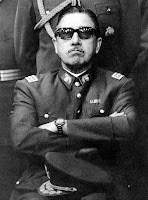 The turn to neoliberalism that Pinochet’s regime inaugurated has been termed a "silent revolution," as in the book titles both of the apologia written by Joaquín Lavín and the leftist critique written by Duncan Green. But Luis Salinas's The London Clinic shows the benefits of simply listening to the general speak: Salinas aims to explain Pinochet and the Pinochet effect primarily by collecting and presenting the general's own words.
The turn to neoliberalism that Pinochet’s regime inaugurated has been termed a "silent revolution," as in the book titles both of the apologia written by Joaquín Lavín and the leftist critique written by Duncan Green. But Luis Salinas's The London Clinic shows the benefits of simply listening to the general speak: Salinas aims to explain Pinochet and the Pinochet effect primarily by collecting and presenting the general's own words. The over-riding impression provided by this collection mostly comprised of quotations (from Pinochet, but also from his collaborators and defenders, plus some press commentary) is of the general's astonishing confidence, his refusal to apologize, but also a certain candor. The most famous example of this attitude is his remark that "burying two corpses in the same grave makes for great economies" (28). He later confirms the bon mot, declaring "That is what I meant. [. . .] I never regret what I say" (107). For Manuel Contreras, former chief of Pinochet's secret service, the DINA, the only regret is "not having been harder on the Marxists" (104).
What becomes clear is that if Pinochet and co. have nothing to regret, they also have nothing to hide. This is why Pinochet's words are so damning: he feels no need for justification and no compunction to persuade us of his methods or his goals. Everything is on the surface. Perhaps there are some details that are not worth exploring, some areas best left unexamined; but these are all rather inconsequential. Thus in a 1984 interview, when asked of the disappeared “Have you ever had any interest in finding out where all those people ended up?” Pinochet responds with condescension: “Señorita, no one knows. Look, if there are right now thirteen million Chileans, let's say twelve million, out of twelve million, two thousand are nothing (he makes a hand gesture to indicate a very small number). [. . .] In this country, señorita, things need to be forgotten” (112-113).
Pinochet produces effects rather than arguments. His ideological deficit reveals itself continually through the quotations collected in The London Clinic. The general has no clothes, but he is happy to parade naked. There is no real pretence that he is anything but guilty. As the Spanish newspaper La Vanguardia comments regarding the judicial process in the British courts, aimed at his extradition to Spain, "No-one speaks of Pinochet as if he were innocent" (95). His defense rested instead upon technicalities.
So a transparent neoliberalism employs technocrats rather than ideologues, concerning itself with the economics of burial and the management of populations rather than with the singular victims whom the families of the disappeared hope to uncover.
No comments:
Post a Comment